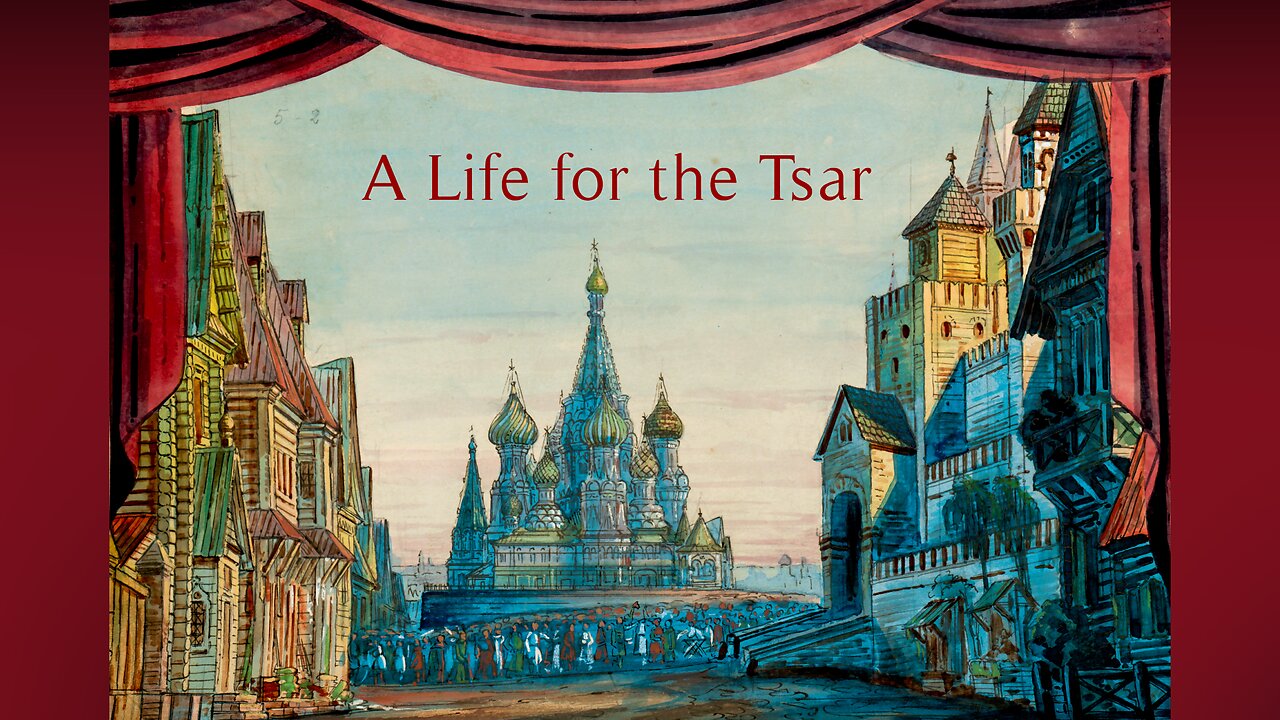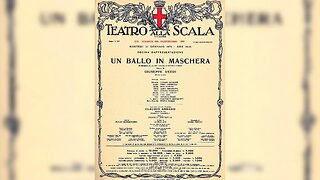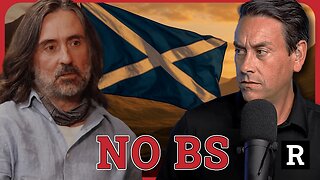Premium Only Content

Glinka - A Life for the Tsar (The Bolshoi Opera 1992)
Composer: Mikhail Ivanovič Glinka
Librettist: Nestor Kukolnik, Egor Fyodorovich (von) Rozen, Vladimir Sollogub and Vasily Zhukovsky
Premiere: 27 November 1836 OS (9 December NS) at the Bolshoi Kamenny Theatre in St. Petersburg
Language: Russian
Translation: English subtitles
A Life for the Tsar is a "patriotic-heroic tragic opera" in four acts with an epilogue by Mikhail Glinka. During the Soviet era the opera was known under the name Ivan Susanin.
Cast & Characters:
Evgeny Nesternko as Ivan Susanin
Marina Mescheriakova as Antonida
Alexander Lomonosov as Bogdan Sobinin
Elena Zaremba as Vanya
Boris Bezhko as Polish Commander
The Bolshoi Symphony Orchestra and Chorus
Conducted by Alexander Lazarev
The original Russian libretto, based on historical events. The historical basis of the plot involves Ivan Susanin, a patriotic hero of the early 17th century who died in the expulsion of the invading Polish army for the newly elected Tsar Michael of Russia, the first of the Romanov dynasty, elected in 1613. The opera was immediately hailed as a great success, and became the obligatory season-opener in the Imperial Russian opera theaters. A Life for the Tsar occupies an important position in Russian musical theater as the first native opera to win a permanent place in the repertoire. It was one of the first Russian operas to be known outside Russia. In keeping with Glinka's European training, much of A Life for the Tsar was structured according to conventional Italian and French models of the period. Nevertheless, several passages in the opera are based on Russian folk songs or folk melodic idioms that become a full part of the musical texture. Most importantly, this opera laid the foundation for the series of Russian nationalistic historical operas continued by works such as Serov's Rogneda, Mussorgsky's Boris Godunov, Rimsky-Korsakov's Maid of Pskov, Tchaikovsky's The Oprichnik or Mazeppa, and Borodin's Prince Igor.
SYNOPSIS
ACT I - The village of Domnino
Antonida is eager to marry Sobinin, but her father, Susanin, refuses permission until a Russian has been duly chosen to take the tsar's throne. When Sobinin informs him that the Grand Council in Moscow has chosen a tsar, everyone celebrates.
ACT II - Poland
In a sumptuous hall, the nobility celebrates the Polish dominance over the Russians by singing and dancing. Suddenly, a messenger comes in with the news that Mikhail Romanov has been selected as the tsar of Russia but is now in hiding. The Poles vow to overthrow him.
ACT III - Susanin's cabin
Susanin and his adopted son, Vanya, pledge to defend the new tsar. Susanin blesses Sobinin and Antonida on their upcoming wedding when a detachment of Polish soldiers bursts in to demand the tsar's whereabouts. Instead, Susanin sends Vanya to warn the tsar while Susanin leads the soldiers off the trail into the woods. Antonida is devastated. Sobinin gathers some men to go on a rescue mission.
ACT IV - A dense forest
Sobinin reassures his men of the rightness of their mission. When night falls, in a part of the forest near a monastery, Vanya knocks at the gates and alerts the inhabitants to spirit the tsar away. Susanin has led the suspicious Polish troops into an impassable, snow-covered area of the forest. The Poles sleep while Susanin waits for the dawn and bids farewell to his children. A blizzard sets in, and when day breaks, the Poles awake. They realise that Susanin has deceived them and so kill him.
EPILOGUE - Red Square, Moscow.
Across the stage walks a crowd of people, celebrating the triumph of the new tsar. Alone in their own solemn procession, Antonida, Sobinin and Vanya mourn Susanin. A detachment of Russian troops comes upon them, discovers their connection with Susanin and comforts them. As the scene changes to Red Square, the people proclaim glory to the tsar and to Susanin's memory.
-
 2:50:06
2:50:06
Adaneth - Arts & Literature
19 days agoVerdi: Un Ballo in Maschera | Pavarotti, Cappuccilli-Abbado, Zeffirelli (La Scala 1978-ENG&ITA SUB)
54 -
 53:29
53:29
Candace Show Podcast
2 hours agoEXCLUSIVE! Brigitte Macron's Lawyer Has A Dark Past. Dan Bongino Speaks Out. | Candace Ep 220
23.1K77 -
 1:18:11
1:18:11
Redacted News
2 hours agoScotland is being DESTROYED and Neil Oliver is trying to save it
14.8K44 -
 20:38
20:38
Exploring With Nug
8 hours agoMissing Tennessee Man Found Crashed in Ravine — Could He Have Been Saved!
2691 -
 LIVE
LIVE
Vedic compatability astrology
2 hours ago"Aleta ST James:The Woman Who Tried to Conquer Time Itself"
223 watching -
 36:36
36:36
Kimberly Guilfoyle
3 hours agoTrump Trade Wins, Live with Daniel Turner & Jarrett Stepman | Ep241
82.6K16 -
 13:16
13:16
Michael Button
8 hours agoWhat If We’re NOT the First Smart Humans?
5.69K4 -
 LIVE
LIVE
The Amber May Show
2 hours agoShattering the Narrative: Trump, Media Collapse & The Rising Chaos
116 watching -
 LIVE
LIVE
LFA TV
23 hours agoLFA TV ALL DAY STREAM - MONDAY 7/28/25
845 watching -
 LIVE
LIVE
freecastle
7 hours agoTAKE UP YOUR CROSS- STOP the Hate From State to State!
145 watching